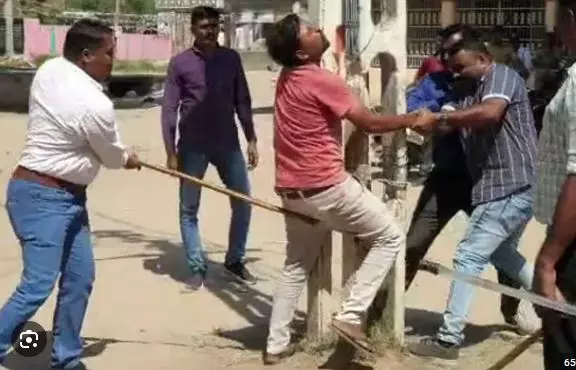
Cops accused in public flogging of Muslim men sent to jail, Gujarat HC highlights human’s honour
text_fieldsAhmedabad: The Gujarat High Court has handed down a 14-day imprisonment and a fine of Rs 2,000 to four police officials involved in the public flogging of Muslim men in Kheda, Gujarat, last year.
The court, led by Justices A S Supehia and Gita Gopi, condemned the "inhumane" act, emphasizing the physical and emotional damage caused by torture.
The incident dates back to October 3, 2022, when the men were held over the allegation of an attack at a Garba event at Undhela village by the police who fastened them onto the pole and flogged them on their backs. In the video of the incident, which went viral on social media, police personnel can be seen subjecting the men to flogging while the public cheered.
The victims, who had moved the Gujarat High Court with a contempt petition against 13 police personnel, sought compensation for the violation of their rights and cited the Supreme Court's guidelines on arrest and detention.
The court, after initiating contempt proceedings, refused to accept the unconditional apology tendered by the accused police officials, asserting that the barbarous acts, captured on video and widely circulated, could not be forgiven easily.
The justices highlighted that the majesty of the court and the self-respect of the complainants had been severely degraded.
Quoting Mother Teresa, the court underscored that human rights are not a privilege conferred by the government but an entitlement of every human being by virtue of humanity. The verdict stressed that custodians of law and order should protect, not abuse civil liberties, and an accused person's dignity should not be compromised once in police custody.
The court's decision emphasized that accepting the apology would be a travesty of justice, considering the inhuman acts committed by the accused, which went beyond the guidelines laid by the Supreme Court. It cautioned against sending the wrong message to society by pardoning such acts, as it could encourage lawlessness.
In its detailed verdict, the court highlighted the many facets of inhumane treatment, stating that if government functionaries become lawbreakers, it could breed contempt for the law and encourage anarchy.
The judgment underscored that a citizen does not shed their fundamental right to life when arrested, covering acts that inflict physical suffering, severe mental pain, or humiliation.






















